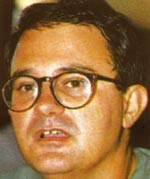Statment
of Arrested Priest's
Peacemaker's personal stories
Peacemaker's personal stories

|
Statment
of Arrested Priest's
Peacemaker's personal stories |
 |
 Religious
Leaders Religious
LeadersTestimonies of Martyrs Blood Tumangu, in Acholi language: ‘the place where the ferocious beast lives’. A small village located at about 30km East of Kitgum, North Uganda. Here, last Wednesday, Father Tarcisio Pazzaglia, Father Carlos Rodriguez Soto and myself, which falls within a difficult mediation of peace, met with a group of rebels of the LRA (Lord’s Resistance Army). Beyond the regrettable incident – a sudden attack of the Ugandan regular military forces, which forced the rebels to flee and us to remain under a shower of bombs and bullets – remains the tragedy of a population, that of the Acholi ethinic group, reduced to exhaustion by the war. A war forgotten which at the most is remembered – it is sad to admit it – when a reduced number of missionaries is abducted or even loses their lives. Meanwhile, a halo of mystery continues to conceal the phenomena of the ‘olum’ (from ‘olum’ ‘grass’, as the rebels are called by the population). It impressed me to hear, from the live voice of these young combatants of Tumangu, the judgement on their leader: a ‘skilful saint’, a ‘good prophet’, as if they underwent a brain washing and the reason cancelled by who knows what kind of evil artifice. Actually, some talk of a collective hypnosis carried out by Joseph Kony, the founder of the LRA. Without any doubt, he is a ‘bright crazy man’ that has managed to face, unopposed, to an absurd crusade against the government of Kampala. On the other hand, how can the madness of Agnes Akot, 35-years-old, be explained, that fought with Kony with his last born strapped to his back in a bundle, embracing his machinegun with casualness. The ‘olum’, once sustained by the Sudanese military forces, appear isolated on a political and military level, especially after diplomatic relations resumed between Khartoum and Kampala. As a matter of fact, the rebels have become arrogant and their recent mass descent from Southern Sudan is symptomatic of the discomfort in the entire region. It is very difficult to know who, behind the scenes, supports them supplying arms, ammunition and what ever else. I’ve heard of talks of military aid parachuted by mysterious planes coming from Equatorial Guinea. In fact, the ‘gift parcels’ for the LRA depart from there, prepared by mysterious benefactors, maybe belonging to the Diaspora of the Acholi in Europe. But it is not excluded that Sudan continues to supply the ‘olum’. In this geopolitical context to say a little disturbing, the only real signal of distension is represented by the initiative of peace promoted by the ARLPI (Acholi religious leaders'peace initiative), the group of religious communities present in the Acholi districts of North Uganda. It is a group of people, led by the Archbishop of Gulu, John Baptist Odama, who firmly believes in the non violent solution of the armed conflict. All the hopes are secluded in the courage of who understood, as Father Carlos and Father Tarcisio, how big is the sufferance of the civil population. It is clear that the negotiation can only reached if both parties accept to completely respect the ‘cease fire’. Maybe never as of today, it is necessary that the international community sustains this peace initiative. Before I departed from Kitgum, last Saturday, Father Tarcisio confided to me: “we place our trust in the intercession of the two martyrs of Paimol, which shall be beatified next October 20 in Rome (Italy), so that the peace operators prevail over the sons of darkness”. Davide Okelo and Jildo Irwa were two young lay catechists, both aged under 20 years, which were killed in hatred for their faith and desire for peace on October 18 and 19, 1918 in Uganda, a few kilometres from Kitgum. A peace that today the Acholi invoke from God. ”. Davide Okelo and Jildo Irwa were innocent victims of a repression on behalf of who opposed to the announcement of the Gospel. (by Father Giulio Albanese) |
|
© 2002 GuluFuture.org
|